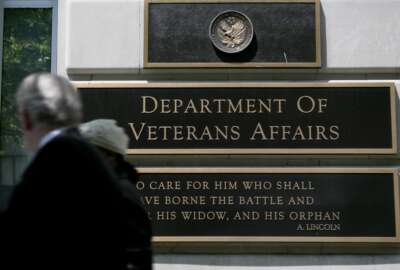
Senators request review of consulting firms’ dual US-China relationships
In today's Federal Newscast: Concerned with potential damage to national security, two Senators have requested a review of consulting firms' dual US-China relat...
- Two Senators want to shed light on potential national security risks posed by consulting firms which work for both the U.S. government and the Chinese government. Homeland Security and Governmental Affairs Committee Chairman Gary Peters (D-Mich.) and Sen. Josh Hawley (R-Mo.) are asking the Government Accountability Office to review the issue. They are concerned those dual relationships may result in Chinese entities gaining access to U.S. government data.
- House lawmakers overwhelmingly approved a new bill to require the Federal Aviation Administration to establish a task force to improve its Notice to Air Mission (NOTAM) system. The technology failure of this system is what caused massive flight delays on January 11. The NOTAM Improvement Act mandates this new task force submit recommendations to Congress within a year to address the shortfalls of the NOTAM process. These recommendations should focus on policy and regulatory improvements, as well as cybersecurity, resiliency and system stability changes. While the House passed a similar bill in the two previous Congresses, the Senate has not introduced a companion bill.
- TSP millionaires have made a slight comeback. The Federal Retirement Thrift Investment Board said that by the end of 2022, there were roughly 77,000 Thrift Savings Plan participants with accounts over a million dollars. That’s a 17% increase since last quarter, but a 32% decline since December 2021. Overall, TSP millionaires now make up about 1.1% of all TSP accounts. That’s compared with less than 1% last fiscal quarter, and 3% last year.
- The Transportation Security Administration is expanding its mobile driver’s license pilot program. TSA plans to work with multiple new states this year to introduce the mobile driver’s license capability at airports. The pilot program allows travelers to use a mobile version of their driver’s license at TSA checkpoints. The technology is already in use at airports in Arizona, Maryland and Colorado. It is currently limited to pre-check customers. TSA also plans to work with multiple vendors this year to expand the mobile ID beyond Apple, Google and Samsung to third-party applications as well.
- Senate Democrats have introduced a plan for the Veterans Affairs Department to modernize its health care facilities. The BUILD for Veterans Act would require VA to put together a concrete schedule to eliminate or repurpose unused or vacant properties. It would also provide annual budget requirements over a 10-year period, allowing the VA to modernize its aging portfolio of medical facilities. The bill would also require the VA to develop and follow a plan to hire construction personnel. Senate VA Committee Chairman Jon Tester (D-Mont.) is leading the bill, along with Sens. Patty Murray (D-Wash.), Sherrod Brown (D-Ohio) and Mark Warner (D-Va.)
- A test bed to get you to think differently about your office space is unveiled. The General Services Administration’s new workplace innovation lab is giving agencies the ability to see what the future of office space could look like. Five vendors are providing modular furniture for a year for agencies to test out for a day or a week or a month. GSA administrator Robin Carnahan said the old office configurations do not make sense anymore. “We have got to have a setup that is one that encourages this kind of collaboration and empowerment, [and] creates those flexible workspaces that they can do those jobs,” Carnahan said.
- A Navy program designed to train engineers and architects will expand to include skilled tradesmen. Fleet Readiness Center East in North Carolina announced it will offer the Pathways Internship Program as a fast track toward employment to students pursuing technical degrees at community colleges. The internship gives students experience with such skills as aircraft maintenance and repair, while earning pay and benefits. When students complete their degrees, they can begin a two-year apprenticeship. Apprentices get additional classroom and on-the-job training as they advance from trainee to journey-level mechanic.
- After a year where it failed to meet its recruiting goals, the National Guard wants to offer more benefits. Although not passed yet, the Health Care for Our Troops Act would offer guard members health care with no fees or co-pays. At a press conference Tuesday, U.S. Army Gen. Daniel Hokanson said 60,000 guard members have no health care. He said the guard also wants to reform duty status so its members get equal pay and benefits when performing the same duties as active duty service members.
- A new dashboard in development may help agencies analyze data on the federal cybersecurity workforce. The Office of Personnel Management’s goal is to help agencies better visualize data — like hiring rates, demographics and job titles — for cyber professionals. OPM has not yet set a release date for the cyber workforce dashboard, but it will most likely come out during the second quarter of fiscal 2023. Eventually, OPM also plans to create a “total workforce dashboard,” covering the same data for all governmentwide occupations.
- The Securities and Exchange Commission may soon no longer be able to lease office space on its own, as the House just passed the SEC Real Estate Leasing Authority Revocation Act. The bill would require the SEC to go through the GSA for its real-estate needs. Congress granted the SEC independent leasing authority in 1990, but the bill’s author, D.C. Delegate Eleanor Holmes Norton, said this authority has led to hundreds of millions of dollars in wasteful spending.
Copyright © 2024 Federal News Network. All rights reserved. This website is not intended for users located within the European Economic Area.
Peter Musurlian
Peter Musurlian is a producer at Federal News Network.
Follow @PMusurlianWFED





